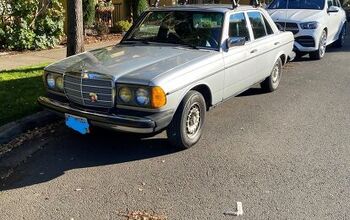UAW Contract Negotiations Blow Past Deadline, Marchionne Lashes Out
The United Auto Workers and the Detroit automakers have been locked in negotiations for months now, as both sides seek to redefine their relationship in the post-bailout era. And though all sides have stressed the importance of avoiding intractable disputes in an alleged new spirit of cooperation, it seems that the prospects of a quick, painless conclusion to negotiations remains elusive. The UAW’s contracts with Chrysler and GM both blew past their deadlines at midnight last night, and Ford, the only manufacturer at theoretical risk of a strike, extended negotiations earlier this week. TTAC has not covered these negotiations in much depth for the simple reason that little information leaks out of them. But with contracts expiring and optimistic rhetoric crashing on the rocks of reality, the frustration is clearly starting to boil over. And who is surprised that Fiat-Chrysler CEO Sergio Marchionne is the first to let his frustration show?
Though Marchionne is probably the most blunt and candid of Detroit’s CEOs, he’s also had the most union-related headaches of late. Wearing his Fiat CEO hat, Marchionne has been battling Italy’s fractious unions for years, as he’s fought to rationalize a deeply broken Italian production base. Whether that experience has given him insight into union negotiating tactics or simply raised his baseline frustration level isn’t clear, but he has broken ranks to publicize a letter [ PDF, tip of the hat to the Detroit News] sharply rebuking UAW President Bob King for allowing the negotiating deadline to expire. Marchionne writes
I flew back from the Frankfurt Motor Show late last night to be here today to finalize the dialogue that has been started by our teams but that required your presence and mine to conclude. You, unfortunately, could not be here, I am told, due to competing engagements.
We have known about this expiration for a long time.
It was discussed at length during an incredibly painful period in 2009 when we argued and pleaded, together, to be given a second chance to put Chrysler right. And we even agreed that were we still around in 2011, we would not go back to the old adversarial and confrontational ways of the past to resolve unsettled matters: that we would have someone else arbitrate our differences.
And so as I sit at my desk now, I am thinking of our 26,000 employees who tomorrow will be working without a new contract, without even an understanding between Chrysler and the UAW that the old one is extended. We have not even agreed on the procedures for arbitration.
Until now, there have been encouraging signs of a new paradigm governing the relationship between us.
After reminding King of his various commitments to a kinder, gentler UAW, his professions of shared interests, and the progress already made through Fiat’s “World Class Manufacturing” program, Marchionne concludes
These are the reasons why we have continued our investment programs in the US, committing more than 4 billion dollars without knowing the outcome of these labor negotiations.
You and I failed them today.
We did not accomplish what leaders who have been tasked with the turning of a new page for this industry should have done.
We did not manage to agree to a set of simple conditions that would have given certainty and peace of mind to the lives of more than 110,000 actives and retirees.
I know that we are the smallest of the three automakers here in Detroit, but that does not make us less relevant. Our people are no less relevant.
The Freep’s Tom Walsh figures that this last line is the most indicative of the trouble brewing. Though he admits Marchionne is prone to outbursts and public theater, Walsh reckons
For example, if the UAW strikes a deal first with GM on key economic issues such as wages and benefits, that could hurt Chrysler’s leverage if it were to threaten taking a key economic issue such as health care co-pays to arbitration.
Another known issue in the UAW-Chrysler breakdown: Shift policies at the Pentastar V6 plant in Trenton South [via DetN]. But it seems that health care is the big issue, and one where thre appears to be daylight between GM and Chrysler. The DetN reported a week ago
A sort of shuttle diplomacy developed between the two automakers and the UAW. As agreements were reached on key issues, union negotiators would take the tentative language over to Auburn Hills. In some cases, Chrysler simply signed off on it; in others, it would negotiate changes that then went back to GM for approval.
GM CEO Dan Akerson met with UAW President Bob King Tuesday, a source close to the talks said, and negotiations are proceeding smoothly between the company and the union. But talks appear to have hit a snag at Chrysler.
“We are nowhere near an agreement,” one person familiar with the situation in Auburn Hills told The News Wednesday.
Nonetheless, all sides remain optimistic that an agreement can be reached between the union, GM and Chrysler by the time the contract expires Sept. 14.
The insider said Chrysler and the union disagree about an approach King is proposing on certain issues.
The UAW president has said he wants to look at creative ways to cut health care costs without reducing workers’ benefits. Chrysler believes workers should shoulder more of the cost of their own health insurance.
Chrysler’s hourly employees are responsible for about 7 percent of their own heath care costs, compared to 33 percent by salaried workers. The average American worker pays about 30 percent. The gap is narrower at GM.
Meanwhile, though Ford has the most to lose as the only automaker without a no-strike clause from the union and the highest recent profits, it “almost has to go last” according to labor analyst Kristin Dziczek. Ford’s union rank-and-file has been considerably more aggressive in recent years, as the firm has not been humbled by bankruptcy and bailout, and they appear to be waiting for GM and Chrysler deals in order to know where to open the bidding. Another possible snag: an arbitration hearing scheduled for today to resolve a UAW complaint over Ford’s reinstatement of white collar bonuses.
Ultimately, the move to extra innings, the public outbursts, and the obvious tensions put all of the last several years of bailout-inspired union-management Kumbaya rhetoric into some serious context. Though the UAW has the most to prove in the eyes of the public, all sides have indulged in the fantasy that “a new era” in Detroit’s labor relations is dawning and all sides are now locked in the same old gamesmanship. As in any negotiation, it’s unfair to blame any one side completely, but in terms of public perception, the UAW clearly has the most to lose. Having utterly failed to make progress in its attempts to organize transplant automakers, the UAW simply can’t afford for these negotiations to get any uglier than they already have. Standing up Sergio was pretty clearly a horrible PR move.
But the great irony of all this is, as Automotive News’s James Treece puts it [via AW], that the negotiations don’t even “matter” all that much. With labor making up only about 15% of the cost of each car, the low-hanging fruit for the OEMs is, he argues, is in rationalizing product development spending,and improving speed to market and supplier relations. In fact, the importance of this negotiating session, argues Treece, is almost entirely symbolic. Which is why the developments of the last 24 hours show that Sergio Marchionne is absolutely correct. Both sides have absolutely failed to reinforce their message that things are different in Detroit.
More by Edward Niedermeyer
Latest Car Reviews
Read moreLatest Product Reviews
Read moreRecent Comments
- Tane94 Not New Jersey, that's for sure!!
- Syke Hopefully they do consider the American market, as I'll be looking at trading in my current Bolt sometime in '25 or '26, and we've had a long good experience with Kia products. Given what GM is currently promising, I'll be looking at Kia well before any upcoming GM product.
- Jkross22 Full self drive - lol, Tesla isn't immune from naming things that are the opposite of what they are and what they do.
- Elrond Why does TTAC, the Press, Commenters, and even General Motors use "GM" when referencing? They changed it to gm quite a while ago.
- Corey Lewis A too-big building that's dated. Easier to sell it off than mess with its continual administration.

































Comments
Join the conversation
While the the 15% figure for labor costs may not be much compared to other "low hanging fruit", I bet transplants have a 1 or 2 basis point advantage due to union work rules. In other words, it costs GM and Fiatsler $17 to get the same productivity/results that cost Toyondissan $15. There's also the non-quantifiable costs to management - in negotiation time and focus away from making cars. And probably lost potential management talent - many of whom regard working for a unionized firm with abject horror.
A strike by the UAW against Ford would seriously hurt the domestic auto industry, but even more so it would hurt the labor movement. Right now the winds of change are blowing against organized labor, in great part due to the strategic error of relying on organizing government employees to make up for shrinking union membership in the private sector. Much of the current budget deficit and long term debt is because of the growth of government, i.e. government employees and the cost of providing them with pay and very generous pensions and other benefits. The taxpayers and voters are starting to understand this. Organized labor bet heavily in Wisconsin and lost. They lost the Supreme Court election and their efforts to recall Republican state senators fell short. This was after dumping millions and millions of dollars into Wisconsin. The mood in the country is shifting and guys like Ron King and James Hoffa and Richard Trumka, either don't know it, or they're blustering to deny it.